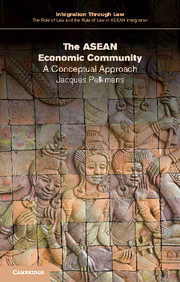Book contents
- Frontmatter
- Contents
- List of figures
- List of tables
- List of boxes
- General editors’ preface
- 1 Introduction and purpose
- 2 Foundations of economic integration fundamentals, stages and credibility
- 3 Conceptual foundation of the ASEAN Economic Community
- 4 Implementation of the AEC: progress in adopting instruments from the Roadmap
- 5 A reality check: comparing the AEC and NAFTA on substance
- 6 Options for the AEC and their practical implications
- 7 Conclusions
- Executive summary
- Appendix 1
- References
- Index
Executive summary
Published online by Cambridge University Press: 05 March 2016
- Frontmatter
- Contents
- List of figures
- List of tables
- List of boxes
- General editors’ preface
- 1 Introduction and purpose
- 2 Foundations of economic integration fundamentals, stages and credibility
- 3 Conceptual foundation of the ASEAN Economic Community
- 4 Implementation of the AEC: progress in adopting instruments from the Roadmap
- 5 A reality check: comparing the AEC and NAFTA on substance
- 6 Options for the AEC and their practical implications
- 7 Conclusions
- Executive summary
- Appendix 1
- References
- Index
Summary
Understanding ASEAN's economic integration model is a genuine challenge. A fundamental reason why conceptual difficulties arise in the case of the ASEAN Economic Community (AEC) is that ASEAN architects observe two stylised (regional) economic integration approaches in the world which they do not want to pursue: the ‘EU model’, which is supranational, far too ambitious and also to a degree ‘open-ended’ in terms of further ambitions; and the classical free trade area (FTA) approach, even when upgraded a little nowadays. The AEC is based on two concepts, presented as ‘parallel’: the ‘single market’; and ASEAN as a ‘production base’ for segments of global value chains. These two instruments have to be understood in the light of what matters most to ASEAN: the medium- or long-term growth prospect for the region. Thus, if the production base is expected to be growth-enhancing in a powerful way (as experience in East Asia suggests), the single market as a ‘concept’ may well be downgraded in actual practice. Since global value chains thrive on ‘openness’ of economies and easy market access (in particular, in East Asia), market access in East Asia via FTAs might rank as high or higher for the success of the ASEAN production base than the pursuit of an ever deeper – indeed, ‘single’ – internal ASEAN market. The present monograph focuses on the ASEAN economic integration logic from a conceptual point of view, but the intricate and multifold linkages with measures relevant for ASEAN as a ‘production base’ have explicitly been addressed as well.
The present contribution to the ASEAN Integration through Law project aims to scrutinise the concepts, logic, sequencing, coherence and options for the 2015 AEC. The author assumes an economic perspective, whilst taking due account of institutional, legal and political economy aspects. Economic integration processes largely take place in markets. Nevertheless, a political desire to pursue ever ‘deeper’ economic integration requires ever more demanding regulatory, economic policy, political and institutional as well as legal commitments by participating countries. This is bound to extend decision-making from trade (and ‘ASEAN’) ministers to broader government policies and reforms of standing economic regulation practices. Assuring ‘deeper’ economic integration is therefore very different in nature than fixing a classical FTA.
- Type
- Chapter
- Information
- The ASEAN Economic CommunityA Conceptual Approach, pp. 202 - 208Publisher: Cambridge University PressPrint publication year: 2016



